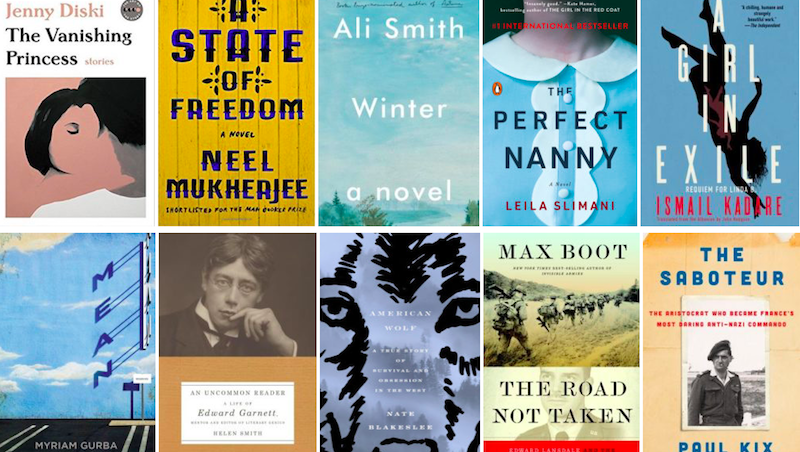
1. The Vanishing Princess by Jenny Diski
(9 Rave, 1 Positive, 2 Mixed)
“Diski’s wonderful story collection, The Vanishing Princess, holds riches for all. Longtime fans will celebrate the very fact of more Diski and thrill to familiar preoccupations in new settings and shapes. Those who know only the self-elegizing Diski will encounter the expansive parameters of her imagination and intellect. Those who read Diski for the first time are in for the delight of discovery … her characters are to a degree her avatars, sometimes in their reenactments of scenes and themes detailed elsewhere in memoirs and essays, always in the trenchant thinking that makes their stories — and hers — memorable.”
–Rebecca Steinitz (The Boston Globe)
*
2. A State of Freedom by Neel Mukherjee
(7 Rave, 5 Positive, 1 Mixed)
“In Mukherjee’s hands, familiar fare is elevated by his empathy for the poor and the journalistic efforts he undertakes to understand them. One may even argue that Mukherjee writes about the rich only in order to write about the poor … This bleak and entirely justified vision of modern India is what binds together Mukherjee’s stories and indeed his oeuvre. In an arid landscape so inimical to the hopes and dreams of the majority, even those who fight to improve their lives will fail.”
–Sonia Falerio (The Financial Times)
Read a conversation between Neel Mukherjee and Hanya Yanagihara here
*
3. Winter by Ali Smith
(8 Rave, 2 Positive, 2 Mixed)
“What Smith has achieved in her cycle so far is exactly what we need artists to do in disorienting times: make sense of events, console us, show us how we got here, help us believe that we will find our way through. Often, that’s what we lean on the classics for, finding answers in metaphor. But in Winter, as in Autumn, Smith gives us a potent, necessary source of sustenance that speaks directly to our age.”
–Laura Collins-Hughes (The Boston Globe)
Read an essay by Ali Smith on J.G. Ballard here
*
4. The Perfect Nanny by Leila Slimani, Trans. by Sam Taylor
(8 Rave, 2 Positive, 1 Mixed)
“The voice of Slimani’s omniscient third-person narrator is consistently chill and precise; her plot spares neither her characters’ fates nor her readers’ sensibilities … Poetic phrases abound throughout the novel and elevate it well above its formulaic premise, one that has inspired many a Lifetime television movie … Surely it’s the enduring masochistic power of that nightmare — rendered particularly vivid here through Slimani’s great stylistic gifts — that have made this slim novel an international bestseller.”
–Maureen Corrigan (The Washington Post)
*
5. A Girl in Exile by Ismail Kadare, Trans. by John Hodgson
(6 Rave, 3 Positive)
“A Girl in Exile is the work of a historic talent who is still at the peak of his power. It confirms Kadare to be the best writer at work today who remembers—almost aggressively so, refusing to forget—European totalitarianism. Kadare tackles Albania’s specific strangeness with a ferocious rigor that would feel scientific if it were not for the haunted, haunting humans he writes into being. Albania is a different country now, but the way it exists for Kadare will continue to exist as long as he writes. Ghosts do not die.”
–Josephine Livingstone (The New Republic)
**
1. Mean by Myriam Gurba
(5 Rave, 3 Positive, 1 Mixed)
“In Gurba’s hands, the interruption of straight chronology serves more than just rhetorical or dramatic effect; it foregrounds the burdens of memory on the body … Mean demands our attention not only as a painfully timely story, but also as an artful memoir … Mean is a powerful, vital book about damage and the ghostly afterlives of abuse.”
–Jonathan Alexander (The Los Angeles Review of Books)
Read an excerpt from Mean here
*
2. An Uncommon Reader by Helen Smith
(5 Rave, 2 Positive)
“Well-researched, neatly written and not above the occasional flash of sly humour, The Uncommon Reader is, necessarily, the study of a circle, or rather a milieu, as much as the man who stares doggedly from its cover. Its ultimate destiny, you fear, is to be cherry-picked for information about its famous names. But Smith does her best for Garnett, sees the point of the aesthetic wars he fought and the value of some of his comparative literary judgments.”
–DJ Taylor (The Guardian)
Read an excerpt from An Uncommon Reader here
*
3. American Wolf by Nate Blakeslee
(4 Rave, 3 Positive)
“…captivating … From that first gripping chapter, Blakeslee carries readers into the politically fraught world of wolves in Yellowstone, where, since reintroduction in 1995, generations of elk-feasting tribes have thrived, creating a roadside wildlife diorama unlike anything in the world. Blakeslee’s riveting account is an East of Eden with wolves.”
–Jason Blevins (The Denver Post)
Read an excerpt from American Wolf here
*
4. The Road Not Taken by Max Boot
(4 Rave, 1 Positive, 2 Mixed)
“The Road Not Taken is an impressive work, an epic and elegant biography based on voluminous archival sources. It belongs to a genre of books that takes a seemingly obscure hero and uses his story as a vehicle to capture a whole era … The Road Not Taken gives a vivid portrait of a remarkable man and intelligently challenges the lazy assumption that failed wars are destined to fail or that failure, if it comes, cannot be saved from the worst possible outcome.”
–Robert D. Kaplan (The Wall Street Journal)
*
5. The Saboteur by Paul Kix
(3 Rave, 3 Positive)
“Kix takes the reader from adventure to adventure, and all of it is narrated with a curiously effective combination of historical perspective and fictional thriller dramatics … Kix’s account begins and ends with glimpses of that much older man, recalling the unspoken code of bravery that guided him and his comrades during the Resistance. The reminder that The Saboteur is at heart a hero’s tale is very refreshing.”
–Steve Donoghue (The Christian Science Monitor)
***

